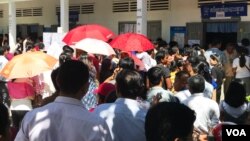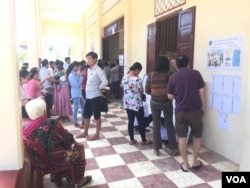Despite threats of war made by the prime minister ahead of Sunday’s vote, Cambodians turned out in their droves to elect new local representatives.
More than 80 percent of those registered to vote cast a ballot in the commune elections, according to early estimates and election observers.
Moeun Tola, executive director of the Center for Alliance of Labor and Human Rights (Central), congratulated voters for exercising their rights.
“In general, civil society groups ... would congratulate as more than 80 percent of voters registered turned out to vote,” he said.
Sam Kuntheamy, executive director of local election watchdog Nicfec, said preliminary estimates suggested that apart from a few reports of minor irregularities, the vote had been largely free and fair.
“Although there were some people trying to win voters’ hearts with cash or goods, voters still understood about their ballot papers clearly and they were satisfied by the election process,” he said.
“Voters turned out in large numbers.”
The reports will be well received by the ruling Cambodian People’s Party of Prime Minister Hun Sen, which has come under fire in past elections for allegedly rigging elections. The real test, however, will come next year when the country is set to hold the next general election.
Koul Panha, executive director of Comfrel, a monitoring group, said 12 election observers had been banned by the authorities from attending polling stations.
Observers also noted that they were unable to sit in on vote counting as it was prohibited under the National Election Committee’s rules.
In the last commune elections in 2012, the CPP won almost all of the 1,646 seats nationwide, while the opposition parties won only 40 seats. This time around early estimates suggest a sea change in politics at the local level, with the country’s main opposition party, the Cambodia National Rescue Party, winning close to half of the votes and about 500 seats.
Tensions between the two major parties continued to simmer in the run up to the vote.
The government criticized the opposition after one of its advisers told a campaign rally that Sar Kheng, the interior minister, could be given the post of deputy prime minister under a Cambodia National Rescue Party government if it wins the general election next year.
The Interior Ministry on June 2 wrote a letter of complaint against Kong Kom, a senior adviser to the CNRP, who it said had told supporters in Kratie province that there would be room for Kheng in a CNRP government.
The ministry said the comments were a “serious insult to the honor of [Kheng]”.









